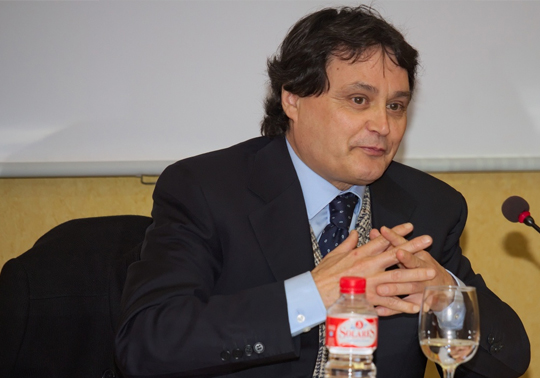The UJI names the professor Jordi Garcés doctor honoris causa
- May 18th, 2017

The Universitat Jaume I of Castellón, at the initiative of the Department of Business Administration and Marketing, will award the professor Jordi Garcés Ferrer the distinction of the doctor honoris causa for his contributions in the field of the social sciences from an interdisciplinary perspective, as well as, his link with the Universitat Jaume I of Castellón. The ceremony will be this Friday at 12:00 at the Paraninf of the UJI.
The professor Javier Sánchez García, full university professor of Marketing and Market Research at the UJI, will be the sponsor. The ceremony will take place on Friday 19 May from 12:00 at the Paraninf of the University of Castellón.
Jordi Garcés Ferrer is doctor in Political and Public Administration, graduate in Philosophy and Educational Sciences (specialised in Psychology), diploma holder in Criminology and Social Work. He has held the Príncipe de Asturias Chair at the Georgetown University in Washington DC, he is full university professor of the Universitat de València and director of the Research Institute on Social Welfare Policy (Polibienestar) of the Universitat de València.
The professor Garcés has over 30 years’ experience in issues related to European compared social politics, political ideologies and the social welfare. He has developed his researching activity both from the Universitat de València and from other universities and research centres in which he has made stays as a visitor researcher. He is author or co-author of more than one hundred scientific publications in Spanish, Valencian, English and German.
In his investiture speech, he will defend the interdisciplinary knowledge as a tool to generate social innovation. The professor Garcés will explain that ‘just like the new ecological conscience understands that it is necessary to live together with nature instead of controlling it, the social sciences shall recuperate their social function by agreeing with the technical sciences the reflection on the interdefinability in order to compose new complex sociotechnical systems and as a result, to reformulate the practical conception of the social sciences’. Furthermore, according to his analysis ‘the fact of transforming the wide social knowledge proved by mathematical algorithms, it will catapult that knowledge to the future of the scientific research and it will be able of modifying the action through the efficient political decision-making in the field of the public administrations’.
Gracés predicts that, from a scientific perspective, ‘the ecosystemic inseparability will be able to replace the Darwinian scheme of survival of the fittest by that of the greater adaptability of the more cooperative one’. In that way, ‘politics should not seek answers in technical certainties or victories of one over another, but in the capacity and the freedom of exchange arguments and synthesise conclusions of balance and consensus in the long term’. From this perspective, ‘consensus is to politics as the interdisciplinary to knowledge. A supposed logic that transforms into oxymoron for being improbable, although, and in fact, that is precisely the essence of politics, because it is complex, dialogical’.
Following the idea of the French thinker Edgar Morin of ‘trying to institute in all universities and faculties an epistemological tithe that would deduct 10% of the time of the course for a common teaching that would deal with the premises of the different knowledge...’, the professor Garcés will propose ‘its institutionalisation but in the research field, through University Institutes of sociotechnical interdisciplinary character which study the heterogeneous and decisive problems of the integral development of the social being. Institutes that consider the advisability of coordinating experts and researchers, from the public to the private, from politicians to scientists, to learn objectives, epistemologies, methodologies’.
+ Info: http://www.polibienestar.org/
File in: Reconeixements externs , Doctors Honoris Causa , Nomenaments , Institut Universitari d'Investigació de Polítiques de Benestar Social (Polibienestar)
















